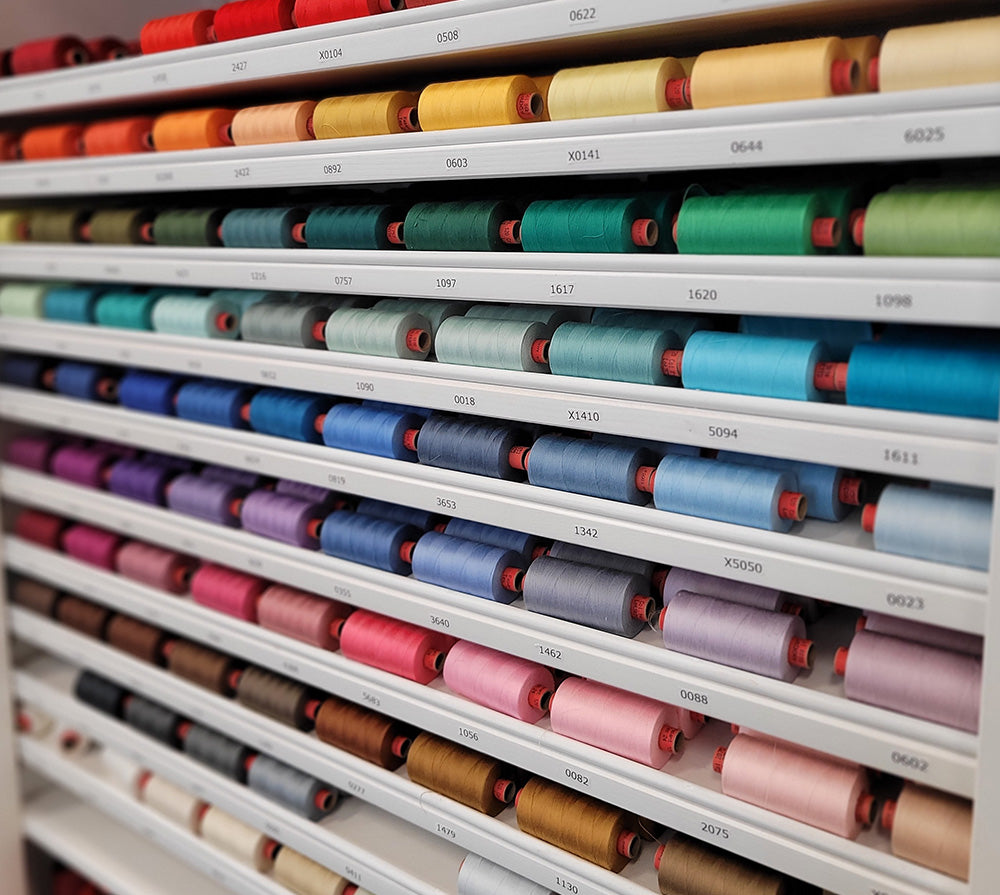The Benefits of Using Quality Thread in your Sewing Machine
When you are having problems with your sewing machine, the first step is to change the machine needle. If you are still having problems, the next thing to question is whether you are using a good-quality sewing thread.
***
Many people do not give the quality or age of their sewing machine thread a second thought, but it is one of the most common causes of sewing machine issues we see.
***
So what is the difference between a Good quality thread and a poor one?
A good quality thread will have the following characteristics:
- The thread is tightly wound on the spool
- It has a slight sheen to it (some exceptions apply here)
- The thread is smooth with minimal fluffiness
- There is a brand name printed on the thread spool itself
- The thread is coated in a special lubricant to help it glide through your machine
A poor quality thread will be:
- Much cheaper than a high quality thread
- Duller in appearance
- Fluffy and uneven with little bumps along the thread
- No branding on the spool (Only on removable packaging if any)
- Older Threads that have decayed over time (10+ years)
It is well worth spending a little extra to get a good quality thread as you will avoid any annoying stitch inconsistencies, sewing machine issues and thread breakages.
In most of the newer machines, the tension disks are hidden inside a plastic cover. This protects the disks from dust and damage, but it also does not allow you to see what may be happening. If you aren't purchasing quality thread, you may be damaging the disks. Eventually, you could have problems with the machine maintaining an even tension as you sew.
If in doubt, ask one of our friendly team members for a thread recommendation!
***
Choosing the right thread for your project
There are many different types of thread available, each with a different purpose. It is important to use the right type of thread for your fabric and sewing needs. Here are some different types of threads and their uses to consider.
Sew all Thread - 100% Polyester
A stand sewing thread used for garment making, crafts and general sewing.
100% Cotton Thread
Often used by Quilters for hand or machine quilting, or by those wanting to keep their garments 100% natural fibre based. Can be used safely in the microwave as well
Polyester / Cotton Mix Thread
This type of thread has a polyester core wrapped in cotton which gives it extra strength compared to plain cotton threads. Some examples are Rasant and Coats Dual Duty
Denim Top Stitching Thread
A thicker thread used for visible topstitching on denim or other heavier weight fabrics
Extra Strong Thread
Useful when sewing heavier fabrics were seams will be under more strain e.g. Outdoor cushion covers, bag making etc. Make you sure that the type of thread you choose is not to thick for your domestic sewing machine. Gutermann Extra strong is a good option available in smaller spools.
Overlocking Thread
Overlockers are more forgiving on thread quality than sewing machines, but a good quality thread should still be used for the best results. Coats Astra is a great option and comes in 5000m cones. There are other specialty threads available for Overlockers as well, such as Seraflock and invisible thread.
Specialty Threads
Sometimes, a specialty thread is needed for a specific task. We have threads designed for invisible stitching, outdoor items that need UV protection, and even elastic threads for stretch sewing!
Embroidery Thread
Available in a wide range or colours and variegated options too, Embroidery threads are a slightly heavier weight than standard thread and they have a nice sheen to make your designs really shine. Primarily used for machine embroidery, they can also be used for decorative stitches on a regular sewing machine to add an extra special touch.

